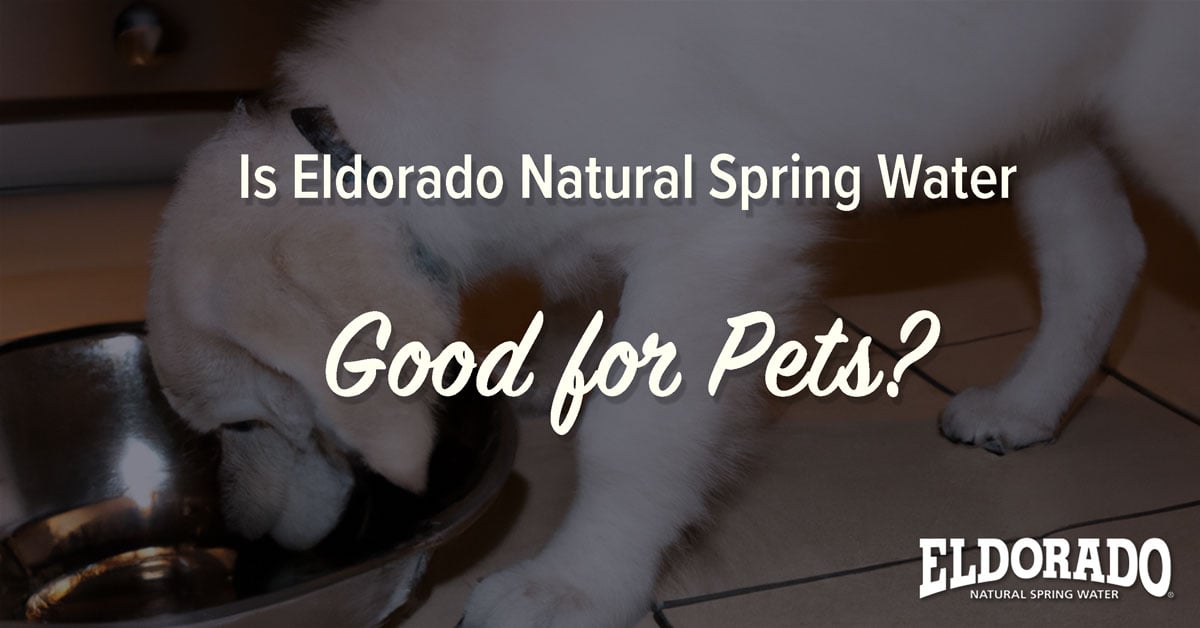Is Eldorado Natural Spring Water Good for Pets?

Drinking water is essential to life. It doesn’t matter if you’re a human, a companion animal, or a creature in the wild, you’ve got to consume water to survive.
In fact, drinking enough water is more crucial than eating. Pets can go a day without food (if they’re not feeling well and don’t want to eat, for example) but not water.
What You Need to Know About Drinking Water Sources for Pets
There are many safe sources of drinking water for pets. They include unfiltered tap water, filtered water, water from reverse osmosis systems, distilled water, and others. In general, if a source of plain water is safe for human consumption, it’s likely safe for pets.
But keep in mind that distilled water and other purified forms may not have the necessary minerals and electrolytes, so they shouldn’t be your pet’s only water source. Pets primarily get their nutrients from food, but consistently drinking distilled water could, over time, lead to a slight imbalance in electrolytes if it's the only water they consume. For the best hydration for your pet, filtered water or bottled spring water is usually preferred. If you're using distilled water temporarily (e.g., while traveling or due to water quality issues), it's fine, but ensure your pet has access to a more balanced water source long-term.
And some water isn’t suitable for cats, dogs, or other animals in any amount. That fact can pose a challenge for pet owners because thirsty animals are “programmed” to seek water from any source. So, that dirty puddle at the dog park looks just as appetizing as a bowl of cool, clean water. And that puddle likely contains bacteria, viruses, parasites, and other harmful pathogens.
Water can also be harmful to pets if it has too much of certain inorganic materials, like calcium chloride or sodium bicarbonate. For instance, too much sodium bicarbonate in water can be harmful, with vomiting being the first sign of toxicity.
Many owners reduce the risk of ingesting tainted water by carrying bottled water for their pets. They’ll often have a water bottle for themselves and water bottles specifically for their animals.
Of course, some minerals are beneficial when present in acceptable amounts. Natural salts are a good example. The bodies of humans and animals need them to function properly. But, again, only in safe small amounts.
How Much Water Should a Dog Drink a Day?
The appropriate daily amount of water for a dog will vary based on its activity level, climate, and other factors. But as a rule of thumb, dogs need one ounce of water per pound of body weight.
Of course, if you’re thinking, “My dog is drinking a lot of water lately,” then it’s a good idea to talk with your veterinarian. Consuming too much water and increased urination can indicate a potentially life-threatening health problem like kidney disease or kidney failure. Not drinking enough is also a reason to contact your vet.
How Much Water Should a Cat Drink a Day?
As with dogs, the right amount of water for a cat daily depends on multiple factors, including their age and the type of food they eat. But most cats do well with five to 10 ounces of water per day.
Keep Your Pets (and Yourself) Hydrated With Eldorado Natural Spring Water
One truth about pet hydration is that you can’t go wrong giving them (or yourself) our award-winning water! Its taste is recognized as among the best in the world—which is less of a concern for them than you, of course—and it has healthy amounts of minerals and electrolytes provided by nature.
So, grab your portable dog water bottle, fill it from the jug of Eldorado Natural Spring Water in your home, and get out to explore the world! Providing bottled water for pets doesn’t mean you’re spoiling them—it just means you want them to be healthy, happy, and properly hydrated!



.jpg?width=352&name=Eldo_WaterDeliveryDuringPandemic-Blog-Image_711x222-(1).jpg)



